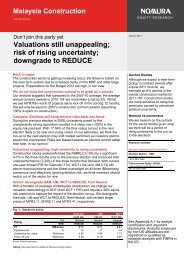Download PDF - ETP - Pemandu
Download PDF - ETP - Pemandu
Download PDF - ETP - Pemandu
Create successful ePaper yourself
Turn your PDF publications into a flip-book with our unique Google optimized e-Paper software.
EPP 11<br />
Building a Test and Measurement Hub<br />
Malaysia has a strong opportunity to establish itself in the<br />
electronics test and measurement field based on its established<br />
foundation. Agilent, which has close to 30 per cent of the global<br />
market share in electronics measurement, produces the bulk of<br />
these equipments in Penang.<br />
The presence of numerous local suppliers that support Agilent in<br />
Malaysia has created an ecosystem that in turn attracts other test<br />
and measurement companies, e.g. National Instruments. It should<br />
be noted that test and measurement knowledge is seen as a key<br />
enabler for other sub-sectors within the electronics industry. As<br />
such, enhancement of this knowledge can help accelerate the<br />
expansion of the electronic industry as a whole.<br />
Achievements<br />
Agilent, working in tandem with the NCIA, will host the Power<br />
Source Solutions Lab and Audio and Signal Analysis Solutions<br />
Lab (including Design Validation). These labs will help local design<br />
partners to offer more than just product design and development;<br />
it will enable them to move up the value chain into areas such<br />
as IP creation, manufacturing, market access and customer and<br />
application specification, and eventually, production of their own<br />
products.<br />
Moving Forward<br />
Leading test and measurement multinationals such as Rohde<br />
and Schwarz, Fluke, Keithley and Tektronix will be enticed to<br />
set up operations in Malaysia by leveraging on the presence of<br />
Agilent and National Instruments. Related industries such as<br />
bioanalytics will also be targeted. The Northern Corridor will<br />
continue to provide the necessary incentives and support to these<br />
EPP 12<br />
Motorola designs and manufactures a substantial proportion of<br />
its two-way subscriber radio products in Penang. These products<br />
serve the critical communications needs of global customers.<br />
Similar to the strategy articulated for test and measurement,<br />
together with support from the Government, Motorola’s presence<br />
can become a strong base for growing local outsource design<br />
partners and Malaysia based original design manufacturers<br />
and eventually building a complete wireless communication<br />
ecosystem. The competencies developed from more than 30<br />
years of design and development work by Malaysian engineers<br />
in designing sophisticated products provide a core to grow local<br />
design houses. However, the cost of entry into design work for<br />
wireless communications is prohibitively high, and action needs<br />
to be taken, both by the private sector and the Government, to<br />
jump-start this industry.<br />
Exhibit 7.5<br />
Global electronic measurement market<br />
is growing at 5% p.a.<br />
Global electronic measurement market (Agilent’s mkt., US$B)<br />
companies as well as other multinationals companies (MNCs) that<br />
can leverage on Malaysia’s test and measurement competency<br />
and capability. Local design houses that service the test and<br />
measurements MNCs will also be incentivised accordingly.<br />
With the above measures, Malaysia hopes to attract an additional<br />
30 per cent more in investments in test and measurements from<br />
MNCs and to have more local test and measurements design<br />
partners.<br />
Expanding Wireless Communication and Radio<br />
Frequency Identification (RFID)<br />
20<br />
15<br />
10<br />
5<br />
0<br />
10<br />
NKEA: Electrical and Electronics EPP 10 – EPP 12<br />
13<br />
2010 2015E 2020E<br />
CAGR<br />
(10–20)<br />
Radio frequency identification (RFID) uses radio waves to identify<br />
people or objects, with applications in contactless payment, asset<br />
management, trusted identification (ID) and document tracking.<br />
The current global market size (2009) for RFID is RM19.9 billion<br />
and is expected to grow to RM54 billion in 2020.<br />
The strategy is to grow RFID in Malaysia by supporting the<br />
growth of local companies. The Malaysian Communications and<br />
Multimedia Commission (MCMC) is the lead agency for developing<br />
the RFID industry. The Government has already taken steps to<br />
support the growth of the RFID industry including establishing an<br />
RFID Centre of Excellence, supporting international RFID standards<br />
and creating a National RFID Roadmap.<br />
16<br />
5%<br />
(more on next page)<br />
131








